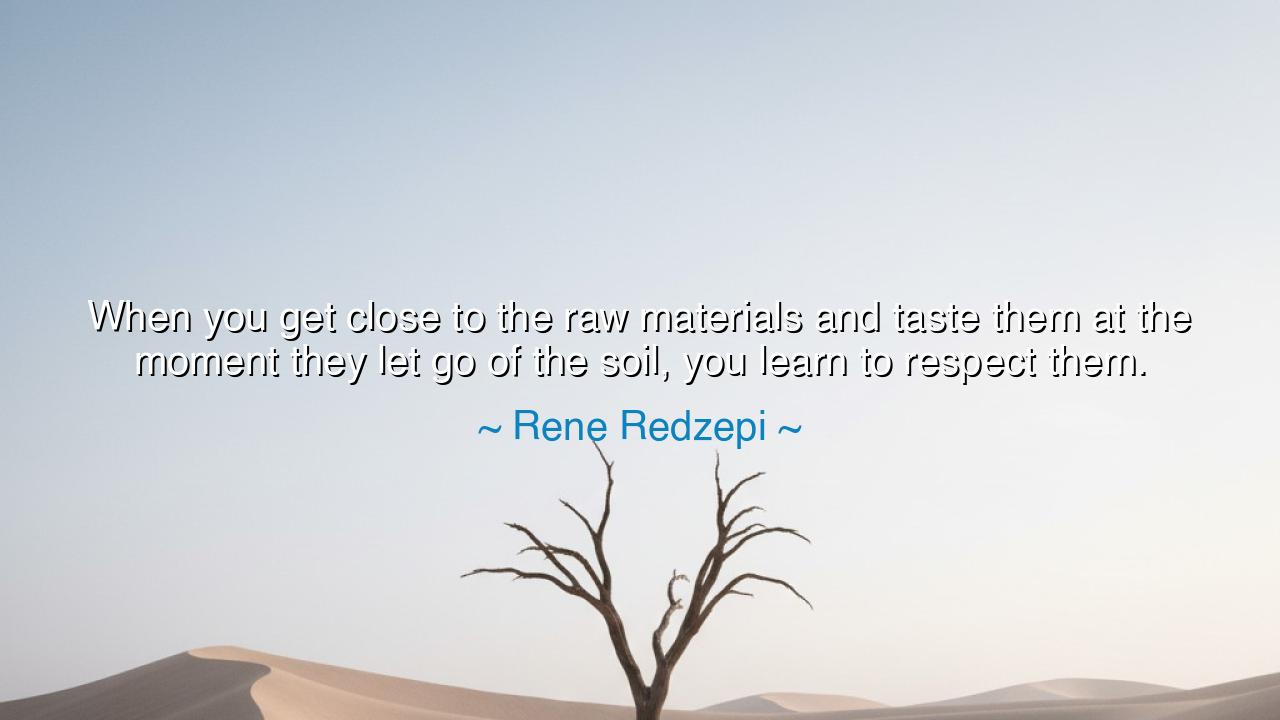
When you get close to the raw materials and taste them at the
When you get close to the raw materials and taste them at the moment they let go of the soil, you learn to respect them.






In the words of Rene Redzepi, the great philosopher of food and nature, there breathes a truth that is both humble and divine: “When you get close to the raw materials and taste them at the moment they let go of the soil, you learn to respect them.” This is not merely the reflection of a chef — it is the utterance of a sage who has seen the sacred link between earth and creation, between hunger and reverence. In his words, we hear the ancient wisdom of those who once bowed before the harvest, who understood that to eat is to participate in the eternal cycle of life and death, of giving and receiving. To taste something as it leaves the soil is to witness a miracle — fleeting, pure, and filled with the quiet voice of the earth.
The meaning of this saying lies in the call to return — to return to intimacy with the world that feeds us. Redzepi reminds us that when we touch the roots of life directly, when we feel the dampness of soil on our fingers and the fragrance of herbs still breathing from the land, we begin to respect what sustains us. Modern life, in its speed and distance, has made us forget the holiness of food. We eat without awareness, we consume without gratitude. Yet the ancient ones — farmers, foragers, shepherds, and cooks — knew that every grain, every leaf, every creature carried within it the breath of the universe. To taste something fresh from the soil is to remember that connection; it is to taste truth itself.
The origin of these words comes from Redzepi’s own awakening as a chef. In the Nordic wilderness, he built his philosophy at Noma, a restaurant that would reshape the world’s understanding of cuisine. He sought not exotic ingredients from faraway lands, but the treasures hidden in his own forests, meadows, and fjords. By foraging — gathering moss, herbs, roots, and wild berries — he discovered that food was not a commodity but a conversation with nature. He learned that when one harvests a carrot still wet with dew, or plucks a leaf warmed by sunlight, one does not merely prepare a meal; one communes with the world. From this reverence was born his quote — a vow to honor the raw materials, the building blocks of life itself.
The ancients would have understood this deeply. Think of Demeter, the goddess of grain, or Ceres, who taught humankind to cultivate the earth. In their myths, the harvest was not just sustenance — it was sacred ritual. When the people reaped, they did so with offerings and songs, for they knew the soil gave life but also demanded respect. To take without gratitude was to anger the gods, to unbalance the harmony of the world. Redzepi’s wisdom is the modern echo of that same reverence: that the act of eating should never be separate from the act of thanking.
And yet, his words carry more than nostalgia — they speak of awareness and responsibility. For when we come close to the raw materials, we see the fragility of their existence. We notice the weather’s moods, the soil’s exhaustion, the cost of waste. Respect is born not only from beauty, but from recognition of interdependence. The farmer, the seed, the sun, the water, and the eater are all bound in a single, unbroken chain. To respect food, therefore, is to respect the world itself. It is to live in such a way that sustains rather than destroys, to consume with gratitude rather than greed.
Let us look to history, to the story of Masanobu Fukuoka, the Japanese farmer-philosopher who practiced what he called “do-nothing farming.” He refused to dominate the earth with machines or chemicals, instead working in harmony with nature’s rhythms. His fields, though humble, grew abundant crops because he listened — listened to the soil, the wind, and the patterns of life. Like Redzepi, he understood that true mastery is not control, but cooperation. Both men teach us that wisdom begins when the hand that harvests trembles with respect for what it touches.
The lesson of Redzepi’s words, then, is clear: do not live as a stranger to your sustenance. Go out into the world and touch the roots of life. Grow something with your own hands, even a single herb on your windowsill. Taste it as it meets the air, and let gratitude fill your heart. Learn where your food comes from, and honor those who bring it to you. Waste nothing, for every morsel is a life transformed — a part of the earth made flesh. And when you eat, eat with awareness, for in that moment you are partaking in the oldest and most sacred ritual of all.
So let this teaching be passed down to the generations to come: to respect life, you must first draw near to it. Approach the soil, the seed, and the flame with reverence, for they are your teachers. Remember that the simplest acts — plucking a fruit, breaking bread, tasting the earth — can awaken in you a wisdom deeper than words. For when you get close to the raw materials, when you taste them as they let go of the soil, you do not just nourish the body — you nourish the soul, and you learn, at last, to live in harmony with the world that gave you life.






AAdministratorAdministrator
Welcome, honored guests. Please leave a comment, we will respond soon